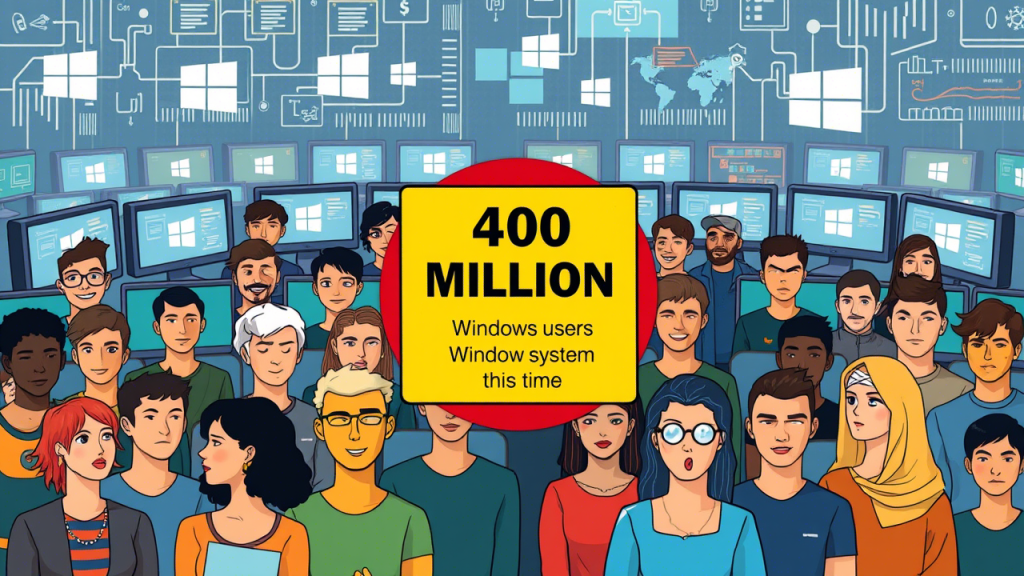HP 14 Laptop, Intel Celeron N4020, 4 GB RAM, 64 GB Storage, 14-inch Micro-edge HD Display, Windows 11 Home, Thin & Portable, 4K Graphics, One Year of Microsoft 365 (14-dq0040nr, Snowflake White)
$170.00 (as of February 2, 2025 12:39 GMT +00:00 - More infoProduct prices and availability are accurate as of the date/time indicated and are subject to change. Any price and availability information displayed on [relevant Amazon Site(s), as applicable] at the time of purchase will apply to the purchase of this product.)Microsoft is getting ready to stop security updates for Windows 10 in October, which affects more than 800 million users. The company has been encouraging people to switch to Windows 11, but many users have not done so yet.
Why Are People Not Upgrading?
There are two main reasons:
- Some people don’t want to upgrade – They are happy with Windows 10.
- Some people can’t upgrade – Their computers don’t meet the requirements for Windows 11.
For those who can’t upgrade, Microsoft suggests buying a new computer—preferably one of their new “Copilot PCs” with AI features.
Extra Support for Windows 10
Microsoft will offer extended support for a fee, which businesses and schools can also use for longer. However, many users (about 400 million) are unlikely to pay for it, meaning they will lose security updates.
Microsoft Removes a Loophole for Old PCs
Previously, Microsoft had allowed a special trick that let users install Windows 11 on older computers by changing a setting in the system (called the Registry Editor). However, this option has now been removed.
Now, when users try to upgrade, Microsoft simply tells them to check if their PC meets the system requirements and warns against upgrading if it doesn’t.
Microsoft is getting ready to stop security updates for Windows 10 in October, which affects more than 800 million users. The company has been encouraging people to switch to Windows 11, but many users have not done so yet.
Why Are People Not Upgrading?
There are two main reasons:
- Some people don’t want to upgrade – They are happy with Windows 10.
- Some people can’t upgrade – Their computers don’t meet the requirements for Windows 11.
For those who can’t upgrade, Microsoft suggests buying a new computer—preferably one of their new “Copilot PCs” with AI features.
Extra Support for Windows 10
Microsoft will offer extended support for a fee, which businesses and schools can also use for longer. However, many users (about 400 million) are unlikely to pay for it, meaning they will lose security updates.
Microsoft Removes a Loophole for Old PCs
Previously, Microsoft had allowed a special trick that let users install Windows 11 on older computers by changing a setting in the system (called the Registry Editor). However, this option has now been removed.
Now, when users try to upgrade, Microsoft simply tells them to check if their PC meets the system requirements and warns against upgrading if it doesn’t.
Microsoft is getting ready to stop security updates for Windows 10 in October, which affects more than 800 million users. The company has been encouraging people to switch to Windows 11, but many users have not done so yet.
Why Are People Not Upgrading?
There are two main reasons:
- Some people don’t want to upgrade – They are happy with Windows 10.
- Some people can’t upgrade – Their computers don’t meet the requirements for Windows 11.
For those who can’t upgrade, Microsoft suggests buying a new computer—preferably one of their new “Copilot PCs” with AI features.
Extra Support for Windows 10
Microsoft will offer extended support for a fee, which businesses and schools can also use for longer. However, many users (about 400 million) are unlikely to pay for it, meaning they will lose security updates.
Microsoft Removes a Loophole for Old PCs
Previously, Microsoft had allowed a special trick that let users install Windows 11 on older computers by changing a setting in the system (called the Registry Editor). However, this option has now been removed.
Now, when users try to upgrade, Microsoft simply tells them to check if their PC meets the system requirements and warns against upgrading if it doesn’t.

Why Should You Be Careful?
If you try to install Windows 11 on an old computer that doesn’t meet the requirements:
- Some hardware and software might stop working.
- Microsoft might not provide updates or fixes.
- Office apps and other programs may not work properly.
Should You Upgrade?
More people have upgraded to Windows 11 in January, but millions still haven’t. If your PC meets the requirements, upgrading is a good idea for better security and new features. If it doesn’t, you might need to continue using Windows 10 with extended support or consider a new PC in the future.



